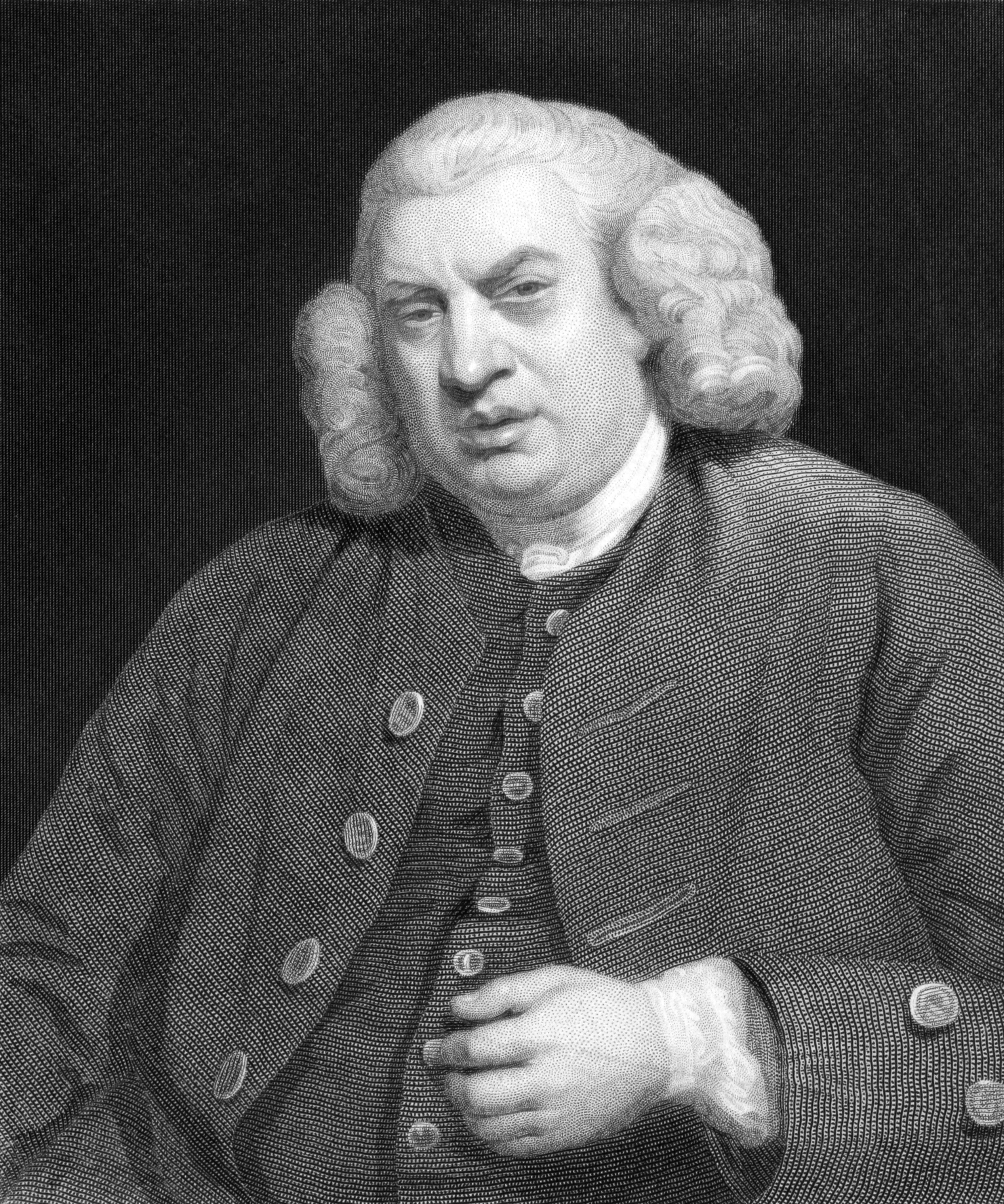Samuel Johnson frasi celebri
“Richardson aveva colto il nocciolo della vita… mentre Fielding si era accontentato del guscio.”
da Thraliana , a cura di Balderston, I, p. 555
riferendosi ai critici; citato in James Boswell, Vita di Samuel Johnson, 1754
citato in James Boswell, Vita di Samuel Johnson, 14 luglio 1763
“Ciò che è scritto senza sforzo è generalmente letto senza piacere.”
da Miscellanies
Johnson Miscellanies
Samuel Johnson Frasi e Citazioni
“Fielding è capace di descrivere un cavallo o un asino ma non ci è mai riuscito con un mulo.”
da Johnson Miscellanies, a cura di George Birkbeck Norman Hill, I, pp. 273-4
Origine: Citato in Ian Watt, Le origini del romanzo borghese (The Rise Of The Novel), traduzione di Luigi Del Grosso Destrieri, Bompiani, Milano, 1985.
“Le cifre tonde sono sempre false.”
citato in Apophthegms, Sentiments, Opinions and Occasional Reflections di Sir John Hawkins, in Johnsonian Miscellanies (1897), vol. II, pag. 2, edito da George Birkbeck Hill
Johnson Miscellanies
citato in James Boswell, Vita di Samuel Johnson, 30 aprile 1773
Origine: Citato in John Lukacs, Democrazia e populismo, traduzione di Giovanni Ferrara degli Uberti, Longanesi, 2006, p. 152.
citato in James Boswell, Vita di Samuel Johnson
Your manuscript is both good and original, but the part that is good is not original and the part that is original is not good.
[Citazione errata] Questa citazione viene spesso attribuita a Johnson ma non trova alcun riscontro nelle opere o nelle lettere dello scrittore, né tanto meno nelle biografie di Johnson scritte dai suoi contemporanei.
Attribuite
Origine: Samuel Johnson did not say: "Your manuscript is both good and original. But the part that is good is not original, and the part that is original is not good." http://www.samueljohnson.com/goodorig.html, Samuel Johnson.com.
“In quante poche case degli amici sceglierebbe di stare un uomo quando è ammalato!”
Origine: Citato in Boswell, Life of Johnson, IV.
Origine: Citato in Dizionario delle citazioni, a cura di Italo Sordi, BUR, 1992. ISBN 14603-X
“La natura ha dato alla donna un tale potere che la legge ha giustamente deciso di dargliene poco.”
Origine: Da Letters, I.
Origine: Citato in Dizionario delle citazioni, a cura di Italo Sordi, BUR, 1992. ISBN 14603-X
Samuel Johnson: Frasi in inglese
1783, p. 501
Life of Samuel Johnson (1791), Vol IV
The Adventurer, # 84 (August 25, 1753) http://www.gutenberg.org/etext/12050
Variante: Silence propagates itself, and the longer talk has been suspended, the more difficult it is to find anything to say.
Vol. II, p. 406
Letters to and from Dr. Samuel Johnson
“Blown about with every wind of criticism.”
1784
Bartlett's Familiar Quotations, 10th ed. (1919), Life of Johnson (Boswell)
“The insolence of wealth will creep out.”
April 18, 1778, p. 400
Life of Samuel Johnson (1791), Vol III
1754
Bartlett's Familiar Quotations, 10th ed. (1919), Life of Johnson (Boswell)
A Journey to the Western Islands of Scotland (1775), Inch Kenneth
“And sure th' Eternal Master found
His single talent well employ'd.”
Stanza 7
Elegy on the Death of Mr. Robert Levet, A Practiser in Physic (1783)
“I never take a nap after dinner but when I have had a bad night; and then the nap takes me.”
1775
Bartlett's Familiar Quotations, 10th ed. (1919), Life of Johnson (Boswell)
March 1781, p. 465
Life of Samuel Johnson (1791), Vol IV
“Employment, sir, and hardships prevent melancholy.”
1777
Bartlett's Familiar Quotations, 10th ed. (1919), Life of Johnson (Boswell)
“This mournful truth is ev'rywhere confessed —
Slow rises worth, by poverty depressed.”
London: A Poem (1738) http://andromeda.rutgers.edu/~jlynch/Texts/london2.html, lines 176–177
Quoted in the "Apophthegms, Sentiments, Opinions and Occasional Reflections" of Sir John Hawkins (1787-1789) in Johnsonian Miscellanies (1897), vol. II, p. 11, edited by George Birkbeck Hill
“The first years of man must make provision for the last.”
Origine: The History of Rasselas, Prince of Abissinia (1759), Chapter 27
“No man but a blockhead ever wrote except for money.”
April 5, 1776, p. 302
Life of Samuel Johnson (1791), Vol III
No. 14 (5 May 1750) http://etext.lib.virginia.edu/etcbin/toccer-new2?id=Joh1Ram.sgm&images=images/modeng&data=/texts/english/modeng/parsed&tag=public&part=14&division=div1
The Rambler (1750–1752)
“That fellow seems to me to possess but one idea, and that is a wrong one.”
1770, p. 181
Life of Samuel Johnson (1791), Vol II
“He left the name at which the world grew pale,
To point a moral, or adorn a tale.”
Origine: Vanity of Human Wishes (1749), Line 221
A Dictionary of the English Language (1755)
Origine: Vanity of Human Wishes (1749), Line 316
The Life of Cowley
Lives of the English Poets (1779–81)
March 1759, p. 97
Life of Samuel Johnson (1791), Vol I
“A man of genius has been seldom ruined but by himself.”
December 21, 1762
Life of Samuel Johnson (1791), Vol I
October 19, 1769, p. 170
Life of Samuel Johnson (1791), Vol II
“Nothing is little to him that feels it with great sensibility.”
July 20, 1762
Life of Samuel Johnson (1791), Vol I
